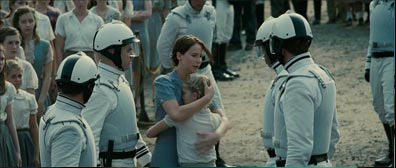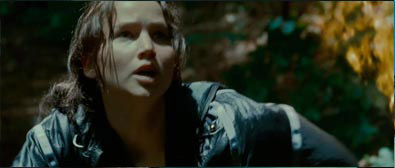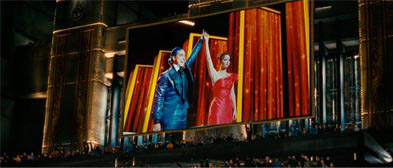"This isn't sugar water. These aren't empty calories.
And I think it's emotionally engaging for the right
reasons. And I think we have phenomenal
performances. No, I'm as proud of this as
anything I've ever done in my life." |
Director and co-writer Gary Ross |
For some reason (canny marketing, the felicity of timing or a simple thirst for a more basic, down and dirty human story?) The Hunger Games has arrived effectively pre-sold. Yes, the first of the trilogy was published in 2008 (what took the film-makers so long?) so there's a loyal fan base snugly in place. As Twilight's star fades, so another franchise steps up to the plate. Harry Potter left a gaping hole in the reliability of theatrical profit and there are very few built in franchises-to-be waiting for exploitation. So can poor but gifted archer Katniss Everdeen and her suitors provide enough of a heart and curiously bloodless action for the masses to come running? That's a fiscal yes... They certainly have come running; the first weekend's box office more than doubled the production budget in three days of business. In terms of execution, pun intended, The Hunger Games trips up a few times but these bugbears may just be my own old fashioned demons wobbling home to roost.
The Hunger Games is a story with some depth or at least the potential of further depth with an excellent heroine and some seriously fine production design, but the movie sports a number of aspects that irritate me personally and while these may not mar your enjoyment of a strong, modest thriller with more than a nod to Battle Royale, they certainly bugged the hell out of me. Let's get the comparisons with the Japanese teen slaughter island movie out of the way. Pointing at The Hunger Games and saying it ripped off Battle Royale is like saying that The Sopranos stole its central character ideas from The Godfather. It's not a big deal that plots and characters are similar in any instance to any other movie. It's how you execute the ideas from a film-maker's own point of view that is the acid test. Battle Royale, if memory serves, doesn't rely heavily on a principal protagonist. The Hunger Games certainly does.

It's the near future and a war and uprisings have devastated the US. The country is renamed now as 'Panem' (the 'bread' part of the Roman quote 'bread and circuses') and the rich and powerful have consolidated their wealth and power at the Capitol while the outlying districts, one to twelve, supply the raw materials needed by the principal metropolis. Problem is, there's not enough to go around and life in the districts is brutish and hard. Sixteen-year-old Katniss hunts illegally and trades her catches to keep her family alive after her father was killed in a mining accident. Every year to quell the mere idea of a rebellion, twenty-four teenagers (two from each district) are chosen to fight to the death in the Hunger Games – think Big Brother with more taste and a little more death. Whoever is left standing is guaranteed a life of luxury. The Capitol's reasons for the games are still completely unconvincing on the page and on screen. Why stage such a spectacle? To keep the Districts' populace in line so they won't rebel like they did 74 years ago? This doesn't hold water but as it's the only reason offered, we'll go with it for now. There's a problem for Katniss. The man she loves is waiting for her back at District Twelve and the man who loves her is fighting side by side with her in the Games... One winner, one survivor. That, as Ned Flanders might say, is one dilly of a pickle.
First of all, let me welcome a smart movie with more than a little nascent political intrigue. I'm half way through book two but I'm fairly sure we're heading for a 'workers unite, you have nothing to lose but your chains' moment in book three. I'll be happy to be proved wrong if the author has something else up her sleeve. If you've read the first book, there are no shocks in the first movie (is it me or is watching a faithful adaptation quite dull especially if you're so fresh off the page? You sit there ticking narrative boxes) but of course there is Jennifer Lawrence. For those who've seen Winter's Bone, her ability is not in question (my Blu-ray's in the post). She manages to elicit a big impact while doing very little and she's more than a credible action heroine. The Capitol city has been CG'ed to the hilt (an aspect of detail we don't really touch upon in the novel as it's told from Katniss' point of view) and it looks opulently disgusting as it should. Woody Harrelson plays the spirit sodden Games Advisor Haymitch with some relish. A previous winner from District Twelve, Harrelson gives the impression that he sees the Games for what they are – a barbaric sleight of hand. But he's sober enough to give help when help is really needed. Cinna (played winningly by singer/songwriter Lenny Kravitz – this man haemorrhages charisma) is Katniss's style guru, a man who knows how important it is for Katniss to appeal to the wealthy sponsors and he's one of the few Capitol inhabitants who regards her as a human being.

Donald Sutherland plays the Capitol president with the requisite power supported by a fluttering of fear while the ever dependable Stanley Tucci dons a blue wig and a set of false teeth to play the acceptable media face of the Hunger Games, Caesar Flickerman, the oleaginous talk show host. His audience (representative, one assumes, of the Capitol's population) is an indifferent slab of humanity that has accepted its astonishing good fortune as if each were born to luxury. They also seem to accept and promote the annual barbarity with the conscience of a fox in a hen house. Their wealth does not extend to their taste. En masse, this hateful group appears to have shown up at a Quality Street look-a-like party. Each garish colour (I suppose) is to show up their disconnect with 'real' people (who are sensible enough to dress in earth tones). It's an easy way to show privilege but it's also an easy way to invite scorn by the skip full. When it comes to the Capitol, the movie audience is given no choice at all. This is an evil place in which evil people live and it has to be brought down. I'm sure book number three will satisfy. Real life rarely does.
My principal problem with The Hunger Games was the choice of visual style. That's a high falutin' way of saying that Gary Ross not only chose to shoot it as if someone told him the studio was pulling the plug at any time ("Quick, get that, and that! And get that too! No, leave the tripod... Quickly!") but he also oversaw an edit that (ye gods!) intensified the 'wobble-cam' rather than dealt it out with some restraint. My fifteen-year old complained about the difficulty of making things out so it wasn't just my problem. Once wobble-cam is employed, an audience isn't really seeing anything and the camera is supposed to be the audience's point of view. You get these ridiculous little glimpses and while the style has its uses (the Bourne franchise for example) it has to be done with enormous care. Here, it seemed too much like snatched footage rather than crafted cinematography. To be honest, it pissed me off. Why then bother to shoot anything conventionally at all? Every now and again we'd get the most extraordinary cut where we'd cross the line to cut to a close up from another close up of the same character – cutting for the sake of changing the shot. I'm sure all this can be justified artistically by the film-makers but film grammar waved goodbye to me watching this movie and it would take too long for me to explain why I rate good film technique. Let's just say that it may seem cool to break the rules but film technique is there to help clarity. We're raising a whole generation oblivious to film grammar and that just adds to the swirly mess of imagery that is media in the western world of the 21st century.

Now, this wobble-cam nonsense may have been employed for a very specific reason. Here's the problem. You're making a mainstream Hollywood movie which means the more audience-friendly you make it, the more audience you attract. But it is the equivalent of making a movie about Mohammed Ali and not showing him fight. In the very worst sense of the word, The Hunger Games is virtually bloodless. You have to have courage if you are making a film about a society that sends twenty-three children to their horrible deaths every year. You can't pussyfoot around that. It's the terror that drives the story. At the very first moment of the games, there's a free for all and it's covered in such a way that you see virtually nothing. Experiencing The Hunger Games is like watching a football match with five tall men weaving in front of you. Get a literal grip! To wobble-cam nod at a wound or to eliminate the blood (as was done digitally to enable the 12A rating) damages the cost of the story on the characters. I'm no gore hound but there is a time and a place for feeling the fatal wounds... What about in a movie about twenty-four kids all trying to kill each other? That would be a good example. When a character dies near the end of the games, the book's description is good enough to lead you to imagine a scene of unique horror, something my fifteen year old was actually looking forward to seeing (sick and twisted puppy that he is). It wasn't there. But then we saw the rating – 12A. There was a great deal of things that simply were not there.
One last bugbear and I do not lay this solely at The Hunger Games' door. It goes for almost all modern Hollywood efforts these days. When was the last time you left the cinema with any lasting impression of the film's score? Once a proud and hugely important emotional component of the film-making process, the soundtrack has now become so generic, it melts into the sound effects. I think The Dark Knight's Joker Theme and a strident action cue from the same film was the last time I listened to modern movie music with some pleasure. I retreat into the classics too often. James Newton-Howard has written some superb and unique scores sometimes for movies not worthy of his talent (I mean did you actually see The Happening?) but even his work on this movie couldn't push itself forward and what an opportunity to do so. Give Katniss a theme, the Capitol a theme, a love theme, a second love theme! Composers, just ease up on the generic action cues and fire up a relationship with the director that challenges you both. Now perhaps this is all to do with the way these films are mixed these days but I miss movie scores as adjuncts to the film going experience. I came away from The Hunger Games with hardly a note that stuck. On that note, I recommend what is, at heart, a smart blockbuster but for the sequel, someone budget for a damn tripod. |